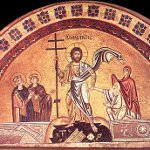Holy Saturday in Eastern Christianity Date in the current year: April 11, 2026
 Holy Saturday, also known as Great Saturday and Holy and Great Saturday, is the Saturday before Easter and the last day of Holy Week which commemorates the last days of Jesus’s life. In Orthodox Christianity, it is the last day of Great Lent.
Holy Saturday, also known as Great Saturday and Holy and Great Saturday, is the Saturday before Easter and the last day of Holy Week which commemorates the last days of Jesus’s life. In Orthodox Christianity, it is the last day of Great Lent.Holy Saturday commemorates the day that Jesus’ body lay in the tomb where Joseph of Arimathea had placed it, and Jesus Christ’s triumphal descent into the underworld referred to as the Harrowing of Hell. In Eastern Orthodoxy, Holy Saturday is also referred to as the Great Sabbath since it is on this day that Jesus Christ “rested” physically in his tomb after suffering on the cross. In the Coptic, Ethiopian, and Eritrean Orthodox Churches, the feast is also called Joyous Saturday.
In the Eastern liturgical tradition, matins (nighttime liturgy that ends at dawn) of Holy Saturday takes the form of a symbolic funeral service for Jesus Christ. It is followed by a procession around the outside of the building of the church. In the afternoon, the Divine Liturgy of Saint Basil the Great is celebrated. It is also customary to read the entire Acts of the Apostles in church. The Paschal Vigil begins after sunset on Holy Saturday, marking the beginning of the liturgical celebration of Easter.
In the Russian Orthodox tradition, the antepedia (hangings), altar cloths and vestments that were changed to dark on Good Friday are changed back to bright just before the reading of the Gospel on Holy Saturday. In Greek churches, the clergy strew flower petals and laurel leaves in the church, symbolizing Jesus Christ’s victory over death.
For the faithful, Holy Saturday is simultaneously a solemn and joyous day. On the one hand, Jesus Christ is dead and laying in the tomb, but on the other hand, the joy of his impending resurrection and Easter is already in the air. In addition, it is considered the day of forgiveness and reconciliation, not unlike Forgiveness Sunday (the last day before the beginning of Lent).
In most households, Great Saturday is the day when the preparations for Easter come to a climax. On this day, people decorate Easter eggs, bake Easter bread (kulich) and cook special dishes such as paskha (a type of Easter dessert made of quark). However, one should keep in mind that it’s forbidden to taste these dishes before Easter since Holy Saturday is the final day of Lent.
In the evening, those who are going to the Paskhal Vigil prepare a basket of food to have it blessed. The contents of the basket usually include Easter eggs, Easter bread, salt, a piece of pork, homemade sausages, butter, paskha or quark, water, and a bottle of wine. After the vigil, these foods are eaten during the traditional fast-break meal.
In some of the traditionally Eastern and Oriental Orthodox countries, Holy Saturday is a public holiday. They include, for example, Cyprus and Georgia. However, in most countries Saturday is already a non-working day, and their governments feel no need to declare Holy Saturday an official holiday since most people don’t work on this day anyway.